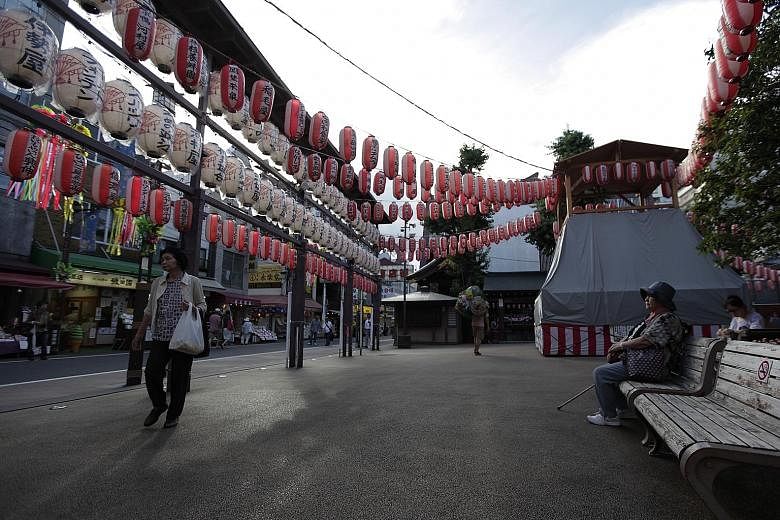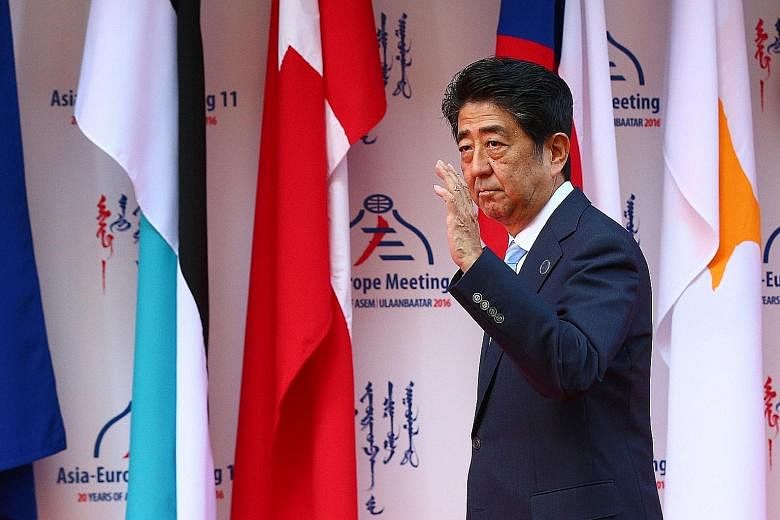TOKYO • Japan's Cabinet yesterday approved 13.5 trillion yen (S$177 billion) in fiscal measures even as the central bank fought market speculation that it is preparing to put the brakes on monetary stimulus for the world's third-biggest economy.
The spending is part of what Prime Minister Shinzo Abe flagged in a speech last week, saying more investment was needed to expand Japan's economy.
Mr Abe had said that funds would be used to provide better port facilities for cruise ships and accelerate the construction of a high-speed maglev train line.
The headline figure of yesterday's package is 28.1 trillion yen, but it includes public-private partnerships and other amounts that are not direct government outlays and thus might not give an immediate boost to growth.
"It follows the pattern they've established over the last couple of years, that they basically announce a very big headline number, but the actual spending is much smaller," said Mr Marcel Thieliant of Capital Economics in Singapore.
"We have a forecast of 0.8 per cent growth for next year, but with this number, the risks are probably tilted to the downside, because we were hoping for a bigger fiscal boost.".
The package includes 7.5 trillion yen in spending by the national and local governments, and 6 trillion yen in low-cost loans.
-
SOME FISCAL MEASURES
-
3.4 trillion yen
To help address Japan's demographic challenges -
6.2 trillion yen
For infrastructure projects -
1.3 trillion yen
To mitigate risks caused by Brexit, and to help smaller companies and regional economies in Japan -
2.7 trillion yen
For relief measures for the April quakes in Kumamoto and the 2011 earthquake and tsunami in Tohoku -
15,000 yen each
Cash handouts for 22 million low-income peopleSOURCE: BLOOMBERG
The measures will be implemented over the next several years, officials added.
Cabinet approval of the package comes as exporters grapple with the yen's rise, Britain's vote to leave the European Union and a slowdown in emerging economies.
At the same time, concern is growing that the Bank of Japan (BOJ) is running out of options for further monetary easing, after it made only minor policy adjustments at a meeting last week.
Governor Haruhiko Kuroda yesterday said the central bank's planned review of its monetary policy next month will not lead to the BOJ weakening its stimulus.
"I don't think that would happen," Mr Kuroda said when asked whether the promised "comprehensive review" might lead to a shrinking of the BOJ's stimulus.
Mr Kuroda met Finance Minister Taro Aso and discussed the approval of the stimulus package aimed at reviving flagging growth.
The government estimated the policy package would bolster gross domestic product by 1.3 per cent in the near term.
The International Monetary Fund has forecast economic growth of 0.3 per cent this year and 0.1 per cent in 2017.
Mr Abe is seeking to expand the economy by 20 per cent by 2020. To do so, he has pledged measures to bolster household incomes, increase the birth rate and provide more care facilities for children and the elderly.
"We have been able to put together a strong package that includes bold investment for the future," Mr Abe said ahead of the announcement, adding that Japan would maintain its fiscal targets for 2020.
The package - the second to be compiled in the current fiscal year - will include cash handouts of 15,000 yen for people on low incomes, NHK reported.
The 4.6 trillion yen figure for the fiscal year ending March includes 100 billion yen brought forward from next year's budget.
BLOOMBERG, REUTERS


